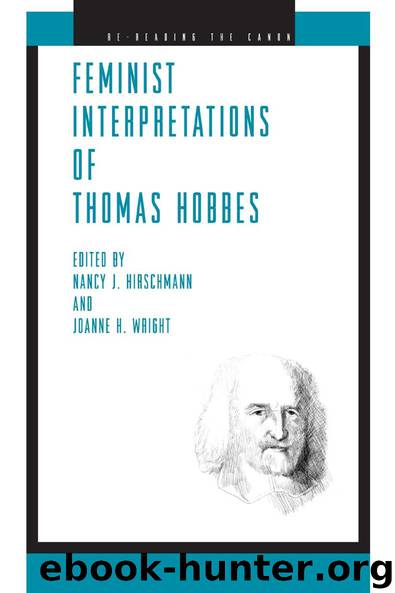Feminist Interpretations of Thomas Hobbes (Re-Reading the Canon) by Nancy Hirschmann & Joanne Wright

Author:Nancy Hirschmann & Joanne Wright [Hirschmann, Nancy]
Language: eng
Format: epub
Publisher: Penn State University Press
Published: 2012-11-12T00:00:00+00:00
Human Nature, Civil Society, and Freedom
To understand the theoretical grounding of Cavendish’s theory of women’s freedom, it is helpful to explicate a few features of her theory of individuals, including human individuals. In her Philosophical Letters, she takes issue with what she sees as Hobbes’s view of freedom, according to which the human will is not free. According to Hobbes, the will is assimilated to fully determined appetites—“the will is appetite; [man can no more] determine his will than any other appetite, that is, more than he can determine when he will be hungry and when not”8—and the will is simply the last appetite before action. It is thus a contradiction to speak of a “free will,” even while it makes perfect sense to speak of a free human (Leviathan, ch. 21, 262). Deliberation is the alternating of desires (or appetites and aversions, including emotions such as hope and fear) to either perform or not perform a given action, before the final appetite (will) determines an action (ch. 6, 127). Similarly, human action is necessitated because human action follows from a necessitated human will. As a result, Hobbes must define liberty or freedom in such a way that it is consistent with necessity:
Download
This site does not store any files on its server. We only index and link to content provided by other sites. Please contact the content providers to delete copyright contents if any and email us, we'll remove relevant links or contents immediately.
| Books & Reading | Comparative Literature |
| Criticism & Theory | Genres & Styles |
| Movements & Periods | Reference |
| Regional & Cultural | Women Authors |
4 3 2 1: A Novel by Paul Auster(11101)
The handmaid's tale by Margaret Atwood(6899)
Giovanni's Room by James Baldwin(5938)
Big Magic: Creative Living Beyond Fear by Elizabeth Gilbert(4763)
Asking the Right Questions: A Guide to Critical Thinking by M. Neil Browne & Stuart M. Keeley(4627)
On Writing A Memoir of the Craft by Stephen King(4251)
Ego Is the Enemy by Ryan Holiday(4024)
Ken Follett - World without end by Ken Follett(3993)
The Body: A Guide for Occupants by Bill Bryson(3863)
Bluets by Maggie Nelson(3744)
Adulting by Kelly Williams Brown(3705)
Guilty Pleasures by Laurell K Hamilton(3618)
Eat That Frog! by Brian Tracy(3550)
White Noise - A Novel by Don DeLillo(3454)
The Poetry of Pablo Neruda by Pablo Neruda(3389)
Alive: The Story of the Andes Survivors by Piers Paul Read(3335)
The Book of Joy by Dalai Lama(3259)
The Bookshop by Penelope Fitzgerald(3249)
Fingerprints of the Gods by Graham Hancock(3241)
